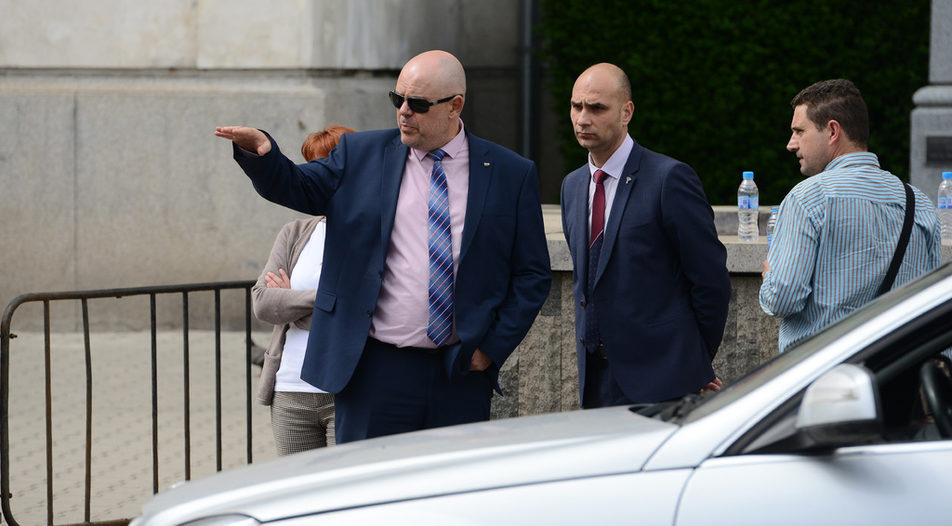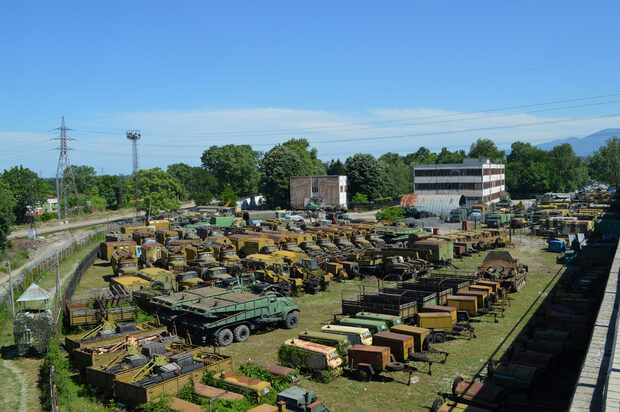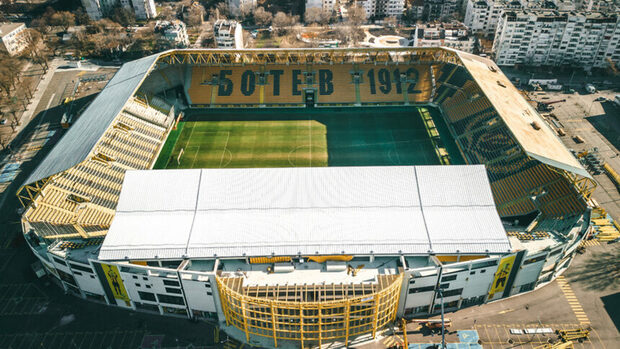I do not share the vision of, let's call them rights' extremists, that legislative, executive and judicial authorities must be separated.
He speaks like a modern reincarnation of Lenin or Robespierre (depending on your cultural context). He wears a revolver under his jacket and sees potential enemies behind every corner who conspire to bring down the state. He fights so-called baddies, but only if they have fallen foul of the ruling political elite. Meet Ivan Geshev, the Deputy Prosecutor General, who is poised to become Bulgaria's next top prosecutor in January 2020. He is the only candidate and has secured the support of the Supreme Judicial Council (SJC) which elects the Prosecutor General.
Even in a country not known for the quality of its judicial system, Mr Geshev is an aberration. While most prosecutors in Bulgaria at least feign political neutrality, he frequently attacks critics of his gung-ho style, alluding to possible retribution. Mr Geshev disregards the basic concept that everyone is innocent until proven guilty and harangues suspects in cases that drag on endlessly.
The Deputy Prosecutor General is no fan of the separation of powers, either. He claims that prosecutors, police and legislators need to work hand in hand. Consequently, he never talks about police brutality. In fact, Mr Geshev encourages it through his personal example, humiliating suspects in carefully orchestrated televised settings.
Both in his actions and public statements, Mr Geshev has flouted basic legal principles that should be inviolable. His imminent promotion will likely only inflame an already deplorable situation. At a time when Bulgaria's inability to reform its judicial system is exasperating its EU partners, Mr Geshev is definitely not the solution. Even worse, he might exacerbate the mess and expand the already oversized role of the prosecutor's service. His track record of dealing with high-level graft cases as head of two specialized anti-corruption units shows that Bulgaria's lapsed anti-corruption fight would only stall under his mandate.
New prosecutorial star rising
Ivan Geshev's star rose after the launch of the investigation of the collapse of Corporate Commercial Bank (Corpbank). He was appointed in 2014 as a lead prosecutor in the biggest case of white-collar crime in the modern Bulgarian history - Corpbank's failure cost 4% of Bulgarian GDP. It was a clear sign of the faith invested in him and his chance to shine.
Mr Geshev was an unknown quantity up until that point. He graduated in law from the Academy of the Ministry of the Interior (not in a law faculty of a university) and after spending a brief period in a Sofia district police department, he moved to the Sofia Investigation Service. In 2006 he joined the ranks of the State Prosecution. As of 2012, Mr Geshev had specialized in corruption as well as financial and tax crimes but had never come to prominence.
The Corpbank case changed this, but not for the better. The investigation dragged on for years, focusing on the bank owner Tsvetan Vassilev (now in hiding in Serbia) but didn't even mention his accomplices. For example, Delyan Peevski, an MP from the Movement for Rights and Freedom party and Mr Vassilev's longstanding business partner, remained outside the scope of the investigation. Many of Mr Peevski's companies were funded by Corpbank under the table, as public documents that are part of the case have shown, and he was instrumental in siphoning many millions of the bank's assets. When journalists asked Mr Geshev why Mr Peevski was absent from the indictment, he replied: "There are many names absent from this [indictment], there is no Putin, no Obama"
There can only be two explanations. Mr Geshev aims to secure an easy victory, because few doubt Mr Vassilev's guilt and he doesn't want to complicate the case. The second, however, seems more plausible - Mr Peevski is the eminence grise of Bulgarian politics and many appointments in the judicial system happen with his unofficial approval. Keeping him in the shadows is a good career decision.
The Corpbank case launched Mr Geshev's career on a stellar path. In 2016, he was appointed Deputy Prosecutor General, second-in-command only to Prosecutor General Sotir Tsatsarov. During his tenure Mr Geshev practically became the face of the Prosecutor's Office, launching a series of heavily publicized - and sometimes controversial - operations.
These included the arrest of the mayor of Sofia's Mladost district Desislava Ivancheva for an alleged bribe at a busy intersection in central Sofia in April 2018. The swoop engaged an inordinate number of police and the staff of the Specialized Prosecutor's Office; Mr Geshev also personally oversaw the whole operation. Moreover, the arrest was aired by all major TV channels over the course of several hours. This raised concerns that the arrest was just a noisy PR stunt on the part of the new institution. Worse still, it triggered suspicions that it flagrantly contravened the suspects' basic human and legal rights, including the presumption of innocence. Sadly, this is nothing new: Bulgaria has lost nine cases in the European Court on Human Rights over the past decade for infringing the presumption of innocence, and would likely lose again with Ivancheva's case.
Opponent of the separation of powers
And while Mr Geshev's track record on his job might cause serious concern, his statements in the first interview for Bulgarian public television channel BNT after his nomination ought to stir panic.
"I do not share the vision of, let's call them rights' extremists, that legislative, executive and judicial authorities must be separated. The principle of separation of authorities is one side of the coin, and the other side is cooperation among the authorities within constitutional powers. And this is how a normal country functions," Mr Geshev said on 23 July, causing uproar and protests against his nomination.
The first dissenting voices were several human rights advocates joined by lawyers from the Plovdiv Bar Association. They sent an open letter to the SJC, calling Mr Geshev's statement "unconstitutional" and asking the Council to re-assess if his reputation and ethical standing met the high standards that such a high public office demanded. "Denying the separation of powers is unconstitutional and raises doubts about the personal impartiality and professional integrity of the magistrate who is doing it," the lawyers wrote. They added that the principle of the separation of powers is the "supreme achievement of democratic societies".
Their demand for the withdrawal of Mr Geshev's candidacy fell on deaf ears. So did the rally of over 2,000 people led by the Justice for All initiative on the last day on which the SJC could have nominated an alternative candidate.
Political numbness
Against the backdrop of civic dissatisfaction with the nomination of a single - and a controversial one at that - candidate for the key post, politicians from parliamentary parties, with few exceptions, maintained a deafening silence on Mr Geshev's nomination. This reinforced the impression of collusion between the main political forces and the feeling that the choice for one of the country's most important posts was predetermined.
"Electing a prosecutor is not a matter for the GERB parliamentary group and is not a political issue," the leader of the parliamentary group of the ruling party Daniela Daritkova told Capital Weekly. The Movement of Rights and Freedoms leader Mustafa Karadayi declined to comment, citing the same reasons. "If we could have done, we would have nominated someone," Kornelia Ninova, leader of the main opposition party, the Socialist (BSP) said in parliament without citing names.
Harassing critics will likely continue
And while politicians remained silent about possible alternatives to Mr Geshev, he himself was not so cagey about naming his opponents.
In the same interview for BNT, the would-be-Prosecutor General fired a salvo against Economedia's publisher Ivo Prokopiev and his media group which includes Capital Weekly, Dnevnik.bg website and KQ, for opposing his nomination. He claimed that Mr Prokopiev preferred an alternative only to ensure "he will not be sentenced and will not return the stolen [money]". Mr Prokopiev, and other independent publishers whose media remain critical of the political status-quo in Bulgaria, have long been harassed by the Prosecutor's Office. Yet this is the first time that a designated Prosecutor General so openly targeted individuals and media groups prior to official selection.
What is more, Mr Geshev highlighted the "bad" political parties, pointing a finger at Democratic Bulgaria. He even accused the extra-parliamentary opposition coalition of being behind the recent data breach at the National Revenue Agency, NAP, which led to the leak of over 11 terabytes of personal details of over 4.5 million Bulgarian taxpayers. The affair became known as NAPleaks. The reason for the accusation? The party has called for the resignation of the minister of finance, Vladislav Goranov, who is responsible for tax administration. Mr Geshev also said that the software security company TAD Group, which has been the main suspect behind the breach of the security wall of NAP, carried out the attack in an attempt to destabilize the country.
The Deputy Prosecutor General's statement provoked outrage and another open letter to the SJC from the Justice for All civic initiative. "Are you going to vote for a candidate for a chief prosecutor who tends to pronounce verdicts in public without a final court decision and to label detained or suspected individuals as criminals even though no indictments have been filed in court against them?" the letter read.
The NAPleaks revealed another worrying trend likely to perpetuate under Mr Geshev: leaking selective evidence collected during an investigation to the media in an attempt to sway public opinion against alleged culprits. Ironically, it's all designed to give a façade of transparency to the prosecution.
The most recent egregious example was when a prosecution spokesperson accused TAD Group of trying to override the security software of the lawn irrigation systems next to the Parliament building. TAD Group was accused of turning them on only when foreign dignitaries were present in order to drench them. The ridiculous charge fell through after the Sofia municipal authority and the administration of Parliament said the irrigation systems around the building are operated manually.
In an attempt to counter the ensuing public mockery, the Prosecutor's Office published several screenshots depicting conversations among TAD Group employees in their office, citing them as irrefutable evidence of their culpability in NAPleaks. Of course, all this has yet to be proven in court.
In any case, the actions and words of the likely future Prosecutor General can only worry those who hope for a judicial system adhering to basic tenets of law and respect for human rights. Mr Geshev's nomination will cast a dark shadow over the most powerful institution in Bulgaria for the next seven years.
What Mr Geshev appointment means for Bulgaria
The appointment of Mr Geshev to the position of the top prosecutor will only cement the existing model of oligarchic rule in Bulgaria. But the problem doesn't lie just with one specific individual.
Mr Geshev is just one manifestation of Bulgaria's decaying and unreformed prosecution system. His possible alternatives wouldn't have been better. Without thorough reform, or rather a complete relaunch of the prosecutor's service, nothing can change.
What is more, judging from the way the Specialized Prosecutor's Office has tackled high-profile figures suspected of corruption and other wrongdoing so far, it is likely that the most powerful and centralized institution in Bulgaria may become an ever bolder arm of repression against opponents of the politico-economic status quo.
I do not share the vision of, let's call them rights' extremists, that legislative, executive and judicial authorities must be separated.
He speaks like a modern reincarnation of Lenin or Robespierre (depending on your cultural context). He wears a revolver under his jacket and sees potential enemies behind every corner who conspire to bring down the state. He fights so-called baddies, but only if they have fallen foul of the ruling political elite. Meet Ivan Geshev, the Deputy Prosecutor General, who is poised to become Bulgaria's next top prosecutor in January 2020. He is the only candidate and has secured the support of the Supreme Judicial Council (SJC) which elects the Prosecutor General.












